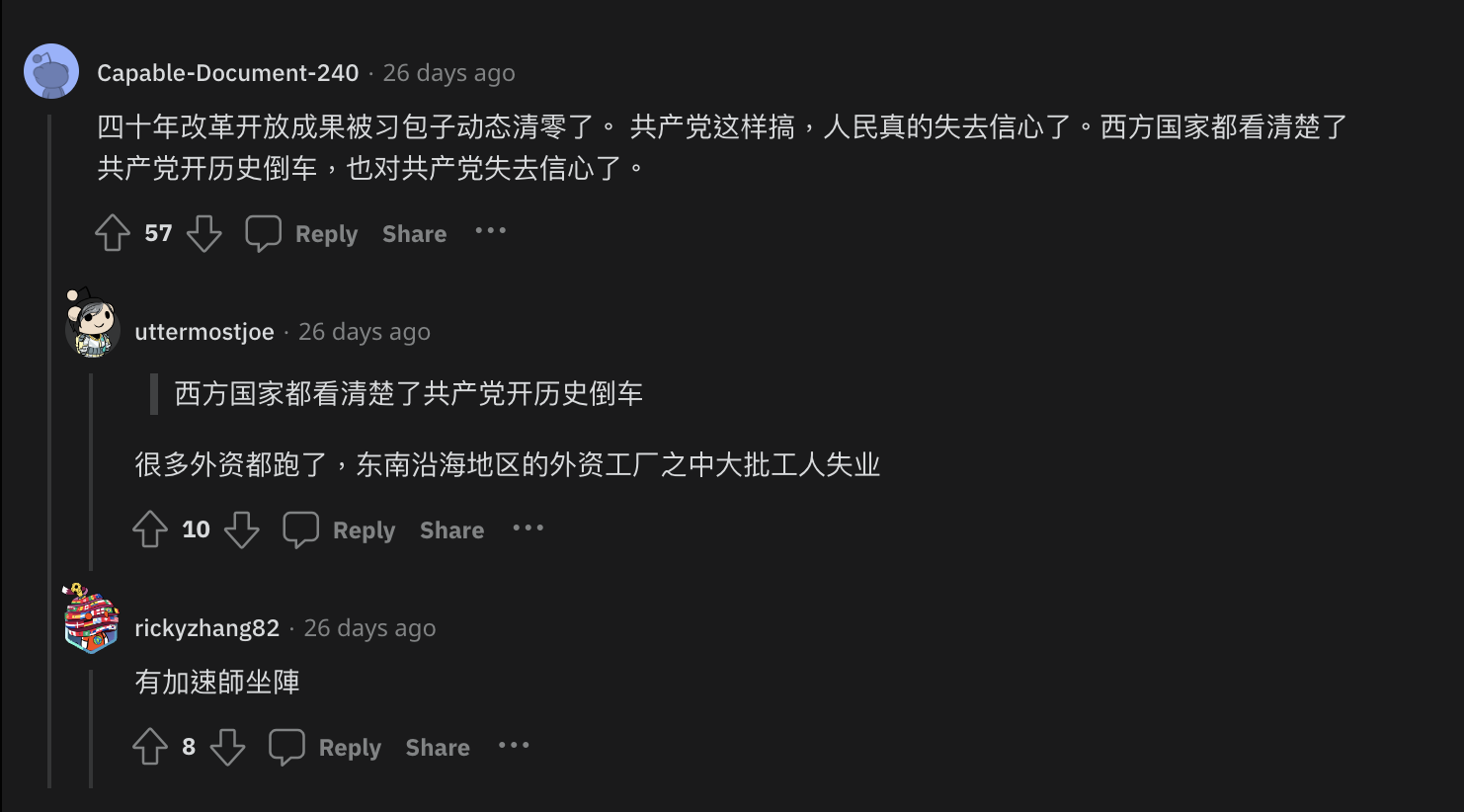China’s looming brain drain and Taiwan’s chance

Source:Getty Images
China recorded a record high unemployment rate, indicating a looming economic downturn. This situation, however, presents opportunities for Taiwan in economic growth, immigration, and trade. These opportunities are worth noticing for the new President of the Republic of China, Taiwan, who will be elected January 2024.
Views
China’s looming brain drain and Taiwan’s chance
By Ian Huang, Ian Murphyweb only
Job Market in China
China reached a record high unemployment rate for youth between the ages of 16 to 24 in June of this year, accounting for over 20%. The overall unemployment rate also rose to 5.3% in July, according to official data. Behind these numbers lies the impact of multiple erroneous decisions by the authorities and economic challenges faced by the younger generation.
The CCP’s "zero COVID" policy played a major role in China's initial success in controlling the pandemic. However, it began to hinder the economy as the rest of the world loosened their COVID-19 restrictions and gradually resumed economic activities. To exacerbate the situation, research indicates a strong negative impact of COVID-19 on the mental health of residents, with young people being significantly affected. As the graduation season arrived this year, millions of university graduates entered the workforce only to find that jobs were scarce due to Beijing's "zero COVID" measures, which made companies hesitant to hire.
This situation is expected to worsen as the next wave of students graduates. A report conducted by Renmin University of China School of Economics warned that "the youth unemployment challenge could continue for the next 10 years and intensify in the short term. If not properly addressed, it may lead to social problems beyond the economic sphere and even become a political issue."
Backlash from the West
On top of the shrinking domestic job market, China is also experiencing backlash from its Wolf Warrior diplomacy, which is now costing China economic opportunities. Despite China questioning its strategy of “wolf warrior” diplomacy, the United States, Japan, and South Korea have been working to repair long-standing conflict and build a diplomatic, economic, and military framework to challenge China’s influence in the region.
China’s use of economic coercion also reduces international trust in engaging with China economically, which is leading countries to diversify their supply chains and end markets away from China. This distrust is also putting the Belt and Road Initiative at risk, as it has come under scrutiny for mixing economic development with political and military goals.
According to Michael Bennon and Francis Fukuyama from Foreign Affairs Magazine, many Chinese-funded infrastructure projects countries found themselves heavily in debt and unable to secure financing for future projects or even to service the debt they have already accrued. From Sri Lanka, Argentina, Kenya, Malaysia, Montenegro, Pakistan, to Tanzania and many others, which troubles the West as they are dangerously indebted, and forced to turn to the International Monetary Fund and other Western-backed international financial institutions for help repaying their Chinese loans.
 A discussion thread on Reddit, talked about Chinese people losing faith in CCP and the laying off in southeast China region. (Source: Ian Huang)
A discussion thread on Reddit, talked about Chinese people losing faith in CCP and the laying off in southeast China region. (Source: Ian Huang)
China's real estate crisis has sent shockwaves through the economy, with the government's efforts to bolster the housing market falling short as unpaid bills from private Chinese developers mount to a staggering $390 billion, as reported by Gavekal Research. This crisis has eroded confidence among the Chinese populace in their country's economic stability, and the loss of over 80% of foreign investment in the second quarter compared to the previous year has triggered massive layoffs in the southeast coastal region. The combination of these factors underscores the challenging economic outlook for China and the ripple effects it has on both domestic and international fronts.
Given China’s micro and macroeconomic challenges, well-educated young Chinese will seek education and job opportunities abroad. This outflow of human capital will fuel foreign economic growth and further strain China’s manufacturing and high tech sectors.
Taiwan’s Chance in China’s Recession
While the outlook for China’s economy seems uncertain, Taiwan stands to gain economically if it enacts the right public policies. Taiwan’s reputation as a stable trading partner has survived the global COVID-19 pandemic, which gives it an additional export edge. Weak consumer demand and China’s politically motivated trade bans further motivates Taiwanese businesses to seek new suppliers and end markets, making it vital for them to receive trade facilitation support.
As private businesses pivot away from the mainland China market, the Taiwanese government should continue developing international trade relationships, especially through IPEF, CPTPP, APEC, and the US-Taiwan Trade Initiative. Although Taiwan is not yet a member of IPEF or CPTPP, it should continue advocating to join this framework, which represents about 40% of the global GDP. As Taiwan waits to join these big ticket economic organizations, it should continue engaging with APEC and the US-Taiwan Trade Initiative as a way of reducing trade barriers, increasing inward investment into Taiwan, and voicing how China has been using economic coercion to influence the island’s politics.
Attract Chinese Talent
Taiwan’s aging demographic further creates an imbalance in its workforce. As the population ages, there will be fewer working young people to support government services for retirees. While politicians in Taiwan recognize the need for inbound immigration, the implementation process of attracting, retaining, and teaching Mandarin to foreign workers has been slow. While Taiwan works to perfect its immigration system, it can take steps to attract mainland workers to fill current vacancies.
Taking Hong Kong as an example, Taiwan opened up an office to process immigration applications from Hong Kong residents after the CCP enacted the National Security Law. From The Diplomat’s coverage story, Chen Ming-tong, the head of Taiwan’s Mainland Affairs Council, viewed this law as an “opportunity to win talent and capital from Hong Kong” for Taiwan.
Accepting Hong Kong immigrants on an emergency basis is largely viewed as a success in Taiwan. The number of Hong Kong immigrants in Taiwan has doubled to around 9,000 during 2019-2022 from 2018, with one in six receiving residency, according to Taiwan’s National Immigration Agency. This increase in demand to immigrate to Taiwan from Hong Kong shows that people want to work in a free market and democratic system.
Attracting more Chinese individuals and corporations requires a different approach compared to attracting professionals from other parts of the world, given that the authorities of the People's Republic of China and the Republic of China (Taiwan) often hold opposing positions in the global order. The Act Governing Relations between the People of the Taiwan Area and the Mainland Area restricts Chinese employees in Taiwan from working for a maximum of one year. However, if the future government uses this opportunity to improve the hiring system and provides a platform for mainland workers, it will greatly benefit Taiwan's short- and long-term development.
Taiwan can use its labor shortage crisis to attract mainland talent to the domestic manufacturing and information technology sectors, which would give these sectors a boost internationally while widening the gap between Taiwanese and Chinese industries. As Chinese is the common language, it would be easier for Taiwanese companies to train, manage, and utilize mainland talent compared to non-native Chinese speakers.
However, the processes for acquiring residency for mainlanders needs to be revised in the near future so that Taiwan can capitalize on the pool of mainland talent looking for stable employment in a democratic political system.
The current immigration system for mainland Chinese discourages workers from staying in Taiwan long-term or entering Taiwan at all. Welcoming mainland immigrants will boost Taiwan’s image as a hub in East and Southeast Asia for technology, manufacturing, and investment.
(This piece reflects the author's opinion, and does not represent the opinion of CommonWealth Magazine.)
The CommonWealth English website and CommonWealth Magazine's Independent Opinion (獨立評論) continue to accept op-eds for the new president. Please follow this link for more info.
About the authors:

Ian Huang is an independent journalist based in Taipei, Taiwan, focusing primarily on politics and China-Taiwan relations. You can reach him on LinkedIn: Nienyun (Ian) Huang.

Ian Murphy has a background in national security and international business. He earned an MA in National Security Studies at American Military University and currently works at Safe Spaces LLC as a Policy Analyst Consultant, where he helps clients bridge the gap between their business strategies and the geopolitical security environment. Ian can be reached at [email protected].






